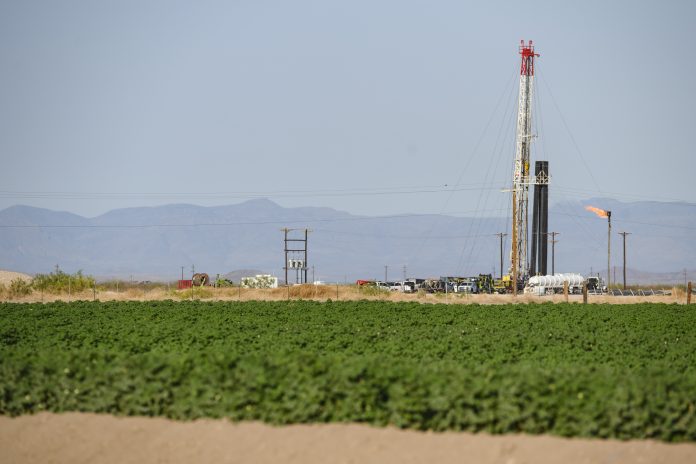Awash in money, much of it from oil and natural gas taxes, after the strain of 2021’s $5 billion in red ink, Texas lawmakers are looking to next year’s legislative session with dollar signs in their eyes and Friday Night Lights competitiveness in their hearts.
State Rep. Brooks Landgraf of Odessa and Sen.-elect Kevin Sparks of Midland say it will be tough to get the Permian Basin its share, but they’re gearing up for the scrum when the 88th Legislature convenes Jan. 10 in Austin.
The House of Representatives and Senate had $110.19 billion for general purpose spending for the current biennium, leaving the daunting deficit, but for the next two years they will have $149 billion and a $27-billion surplus, according to State Comptroller Glenn Hegar.
Landgraf said 51 percent of the revenues are from sales taxes, 8.4 percent from oil production taxes, 6 percent from natural gas, 7.6 percent from motor vehicle sales and rentals, 5 percent from franchise taxes, 1.3 percent from motor fuel taxes, 9 percent from other state levies and 11.8 percent from fees and other non-tax sources.
The Republican chairman of the House Environmental Regulation Committee said Wednesday that oil taxes will boom by 90 percent and generate $12.81 billion compared to $6.6 billion. Natural gas money will balloon by 266 percent and amount to $9.15 billion compared to $2.49 billion, he said.
“You see the hands start to come out when the comptroller makes his revenues estimate public and everybody knows how much is in the state coffers,” Landgraf said. “The Basin has been allocated a record-breaking $3 billion over the next 10 years in the Texas Department of Transportation’s Unified Transportation Plan, but as everyone who lives in West Texas knows, we have plenty of needs in our highway infrastructure.
“I’ve gotten to be real close with all the transportation commissioners and have let them know what a dire situation we have in terms of fatal accidents. Just because we don’t have big city freeways out here doesn’t mean we don’t have real transportation needs.”
The attorney said citizens must have ample health care opportunities and that superintendents in the six school districts he will represent in the redrawn 81st District “want to make sure their schools are properly funded.”
“We are also overdue for broadband infrastructure in West Texas,” he said.
After Jan. 1, Landgraf will represent 194,303 people in Winkler, Ward, Loving and Ector counties, having lost Andrews County in statewide redistricting to House District 88, which is represented by Canadian Republican Ken King.
“I don’t care if it’s oil and gas severance tax revenues here or sales taxes at Neiman Marcus in Dallas, I’ll be fighting with our West Texas delegation to be sure we get our fair share of state resources,” he said.
Noting the Legislature gave $9 billion to public schools in 2019 and the same amount two years later, Landgraf said, “The superintendents are saying we need to make that commitment again and I’m confident we will be able to do that.”
He said he was additionally pleased in 2021 to relieve oil country schools from some of their “Robin Hood” requirements to give money to other districts.
Referring to the age of colonialism when big countries extracted the natural resources of smaller ones without compensation, Landgraf said, “The days of the Permian Basin’s being treated like an extraction colony by the big cities are over.
“I know what the value of West Texas is to the state and I’m making sure the state recognizes our value because so much of the business in Houston doesn’t occur without the work that goes on at a well in Wink.”
Advocating for the immense Senatorial District 31, which goes to the upper Panhandle, Sparks said the Basin’s oil and gas and the Panhandle’s agriculture “represent the lion’s share of why we got this huge surplus.”
Sparks’ goals are bolstering transportation, enhancing water supplies, lowering property taxes, defeating “green” legislation that would cut oil and gas production and strengthening the statewide power grid.
“I’ve been told by legislators that it’s easier going into a session with a deficit than it is with a surplus because everybody has their hands out looking for dollars,” said the Republican, who heads a family-owned independent oil and gas company, Discovery Operating.
“This legislative cycle will be exactly that. Everybody is wanting more for their projects, but I see some property tax relief coming.”
Referring to Texas Attorney General Ken Paxton, Sparks said, “It will certainly be critical to maintain our attorney general, who has been very aggressive in pushing back against the federal government on all this Green New Deal stuff.
“He has been a really strong advocate for oil and gas and agriculture over the last six or seven years.”
Paxton is being challenged in the Nov. 8 election by Democratic nominee Rochelle Garza.
Sparks said the western Panhandle has been greatly helped by the establishment of dairies at Dalhart, Dumas and Sunray and by the Hilmar Cheese Co. north of Dalhart, to which 280 trucks bring milk each day for the daily manufacture of a million pounds of cheese.
“We have not fixed our grid system,” he said. “Austin wants to tell us that the problem during Winter Storm Uri was the natural gas industry, but that was not the case. There was too high a percentage of power from interruptable sources like wind and solar. Extreme events, hot or cold, tax the grid because the renewables get so much subsidy and there is no economic reason for gas buyers to put money into generation. We’ve got to wake up and start addressing these issues if Texas is going to be viable and have the electricity we need with gas-powered and I believe nuclear generation.”




